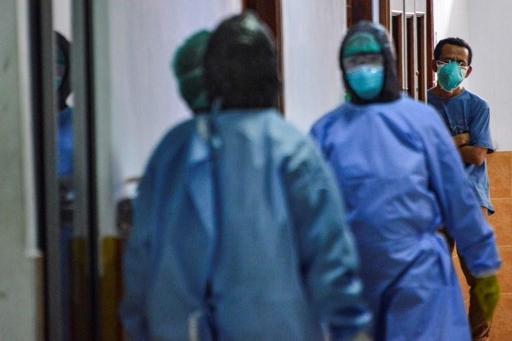With confirmed cases of the coronavirus in Belgium, the country is in "phase 2" of the emergency plan, but what does that mean?
In Belgium, the risk of the coronavirus becoming an issue is constantly being evaluated since the outbreak in January, and even more so since the outbreak in northern Italy. The Risk Assessment and Management Groups. Additionally, a special scientific committee for the new coronavirus has been set up to assist the authorities. All these organisations together carry out a continuous risk analysis.
"In the past, those plans were written to suit certain threats, so you had an Ebola plan, a bird flu plan... However, because of all those different plans, it was difficult to know and apply them all. Now, a generic toolbox has been put together with different tools, which we can then put together. The approach does not depend on a particular disease or virus," said spokesperson Jan Eyckmans of the FPS Public Health, reports VRT.
The emergency plan consists of 3 phases. At the moment, Belgium is in Phase 2.
Phase 1: Keep the virus out
As long as there are no infections in the country yet, the goal is to keep the virus out for as long as possible. "Trying to guard the territory and keep the virus out as long as possible," said Eyckmans.
In the first place, scientific information about the virus is collected to adapt the 'generic emergency plan' to adapt it to the specific circumstances of the Covid-19 coronavirus, in this case.
"Then, we create a template for the doctors and supplement it with the right content. It is, as it were, a checklist for what doctors should pay attention to, and what they should do," said Eyckmans. "From the general practitioner in the smallest village to the largest university hospital, everyone gets that plan," he said, adding that the plan is also constantly being adapted and made more detailed.
Reference hospitals, in this case, these are the UZ Antwerp and the St Pieter's hospital in Brussels, are determined. It is important that all this has happened before the first infected patient is diagnosed, according to Eyckmans, so that everyone knows who is doing what when the first case turns up.
People with suspicious symptoms are tested and, if necessary, placed in quarantine, like the people who returned from Wuhan at the beginning of February and had to spend 14 days in isolation.
Related News
- Coronavirus could be spreading undetected in Belgium, epidemic expert warns
- Coronavirus: International threat level 'very high'
- What we know about Belgium’s coronavirus patients
- Belgium enters Phase 2 for coronavirus: what does it mean?
- Coronavirus: 6 new cases in Belgium on Monday
- Coronavirus in Belgium: 'Panic is more dangerous than the virus'
Phase 2: Keep the virus under control
As soon as an infection turns up in Belgium, Phase 2 comes into effect, meaning the country has been in phase 2 since Sunday 1 March.
The very first Belgian infected with the coronavirus, who came back from the Chinese city of Wuhan, is not being counted, as he was repatriated under controlled circumstances, and there was no chance that he had infected other people.
The aim is to let the virus spread as little as possible, using a system of "trace, contact and check."
"The patient is being cared for, but we have to react very quickly to identify their close contacts. This involves family, friends, housemates, colleagues, but we also check whether or not the patient has taken the plane, because if so, the other passengers on the plane are tracked down," said Eyckmans.
Phase two will remain in force for as long as there is an overview of where the infections are coming from. "Once again, it's a matter of gaining time and holding out as long as possible. If we no longer know the sequence of infections and lose control, we move on to Phase 3. That can be after a few months, but that can also happen after a few days, as was the case in Italy," he added.
Phase 3: The virus is no longer under control
Phase 3 kicks in when it is no longer possible to determine who infected who, meaning the number of infected people is increasing fast.
The first major priority is ensuring medical care. "It is very clear that people with pre-existing medical conditions, or are older, are a risk group. Medical support is needed to minimise the risk of death. The right care is can save lives," said Eyckmans.
The capacity of the hospitals must also be kept under control, by dividing the patients between the hospitals and postponing any non-urgent interventions.
The second major priority is to (try to) contain the virus by taking measures, which can be far-reaching, mainly to ensure that too many people will not gather in one place, reports Metro. "Shut down the football competition, ask people not to go to the cinema for a while, close schools," said Eyckmans. "However, then it is no longer just the FPS Public Health that decides, those are decisions of the government," he added.
The National Crisis Centre will then start managing the public. "If you close down a school, you cause a chain reaction. Parents cannot go to work, there is an economic impact. So then everything and everyone will be coordinated by the Crisis Centre," Eyckmans said, adding that this has never been necessary before.
Closing borders or isolating entire villages is not an issue in Belgium, Eyckmans said. "That's unrealistic and inefficient," he added.
Maïthé Chini
The Brussels Times

